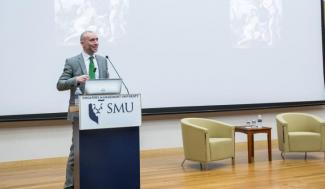
Professor Alessandro Acquisti from Carnegie Mellon University spoke on the topic of data privacy as the 20th speaker of the SMU Presidential Distinguished Lecturer Series on 15 September 2015.
More than 200 people from the SMU Community, senior executives from IT companies, financial institutions, law firms, and staff from the Personal Data Protection Commission, listened in rapt attention as Professor Acquisti, who has conducted award-winning research on data analysis, privacy and social media, shared his insights into various aspects of data privacy.
Professor Acquisti is a Professor of Information Technology and Public Policy at the Heinz College, Carnegie Mellon University (CMU). He is the director of the Privacy Economics Experiments Lab, as well as co-director of the Centre for Behavioural and Decision Research at CMU. His studies have spearheaded the application of behavioural economics to privacy and information security decision-making. A recipient of the PET Award for Outstanding Research in Privacy Enhancing Technologies, the IBM Best Academic Privacy Faculty Award, and numerous Best Paper awards, Professor Acquisti has co-authored three books and over 30 journal articles. His findings have been published in many reputable journals, including the Economist, the New York Times and the Wall Street Journal.
In his lecture, Professor Acquisti contended that privacy is not a modern invention, but a universal human trait that has historical evidence. Scholars have uncovered evidence of privacy-seeking behaviours across peoples and cultures separated by time and space: from ancient Rome and Greece to pre-industrialised Javanese, Balinese, and Tuareg societies. Such cues could also be found in the texts of ancient religions. For example, the Quran instructs against spying on one another; the Bible relates how Adam and Eve discovered their nakedness after eating the fruit of knowledge and covered themselves in shame from the prying eyes of God.

[Photo: SMU President Professor Arnoud De Meyer moderated the Q&A session.]
Professor Acquisti also posited a conjecture on the evolutionary roots of privacy concerns. He argued that human responses to threats in the physical world are sensitive to stimuli which we have evolved to recognise as signals of danger. However, those signals are absent, subdued, or manipulated, in cyberspace. Drawing conclusions from a series of lab experiments, Professor Acquisti said, “Online, we often lack sensorial input. If the evolutionary conjecture is correct, people naturally know how to manage their privacy offline, such as how loud to talk or not to talk during dinner so as not to be overheard. But online, we don’t see Facebook monitoring us, we don’t hear Google tracking us, we don’t smell data companies surveilling us, hence we lack sensorial input which could trigger privacy-sensitive behaviour.” Professor Acquisti remarked this may help explain why it is so difficult to protect privacy online, and why the design of privacy technologies may need to consider visceral interventions.
His research and experiments also showed that privacy is very contextual, people value both the sharing and protection of information. In addition, any innocuous piece of personal information posted online can become sensitive. One experiment demonstrated how facial recognition, data mining algorithms and statistical re-identification techniques can give savvy online users access to critical information such as Social Security numbers.
Professor Acquisti also argued that people are easily influenced in what and how much they disclose, relinquishing control over one’s personal data and over one’s privacy alters the balance of power between those holding the data and those who are the subjects of that data.


[Photo: Many interesting questions were posed by an enthusiastic audience during the Q&A session.]
In a lively Question & Answer session moderated by SMU President Professor Arnoud De Meyer, Professor Acquisti fielded numerous questions from an enthusiastic audience. They asked about the effectiveness of the data protection act, how privacy is viewed in different countries and cultures, whether people are more concerned about sharing data with companies vis-à-vis governments, and the usefulness of privacy indices.
The Presidential Distinguished Lecturer Series was launched in 2005 with the aim of stimulating discussions among faculty, staff and students as well as the larger external audience on issues of contemporary interest and significance. Internationally-renowned and respected academics, scholars and business leaders who have attained prominence in their respective fields, are invited to share their refreshing insights and experience at this lecture series so as to grow and enrich the intellectual capacity and diversity of SMU through interactive discourse.